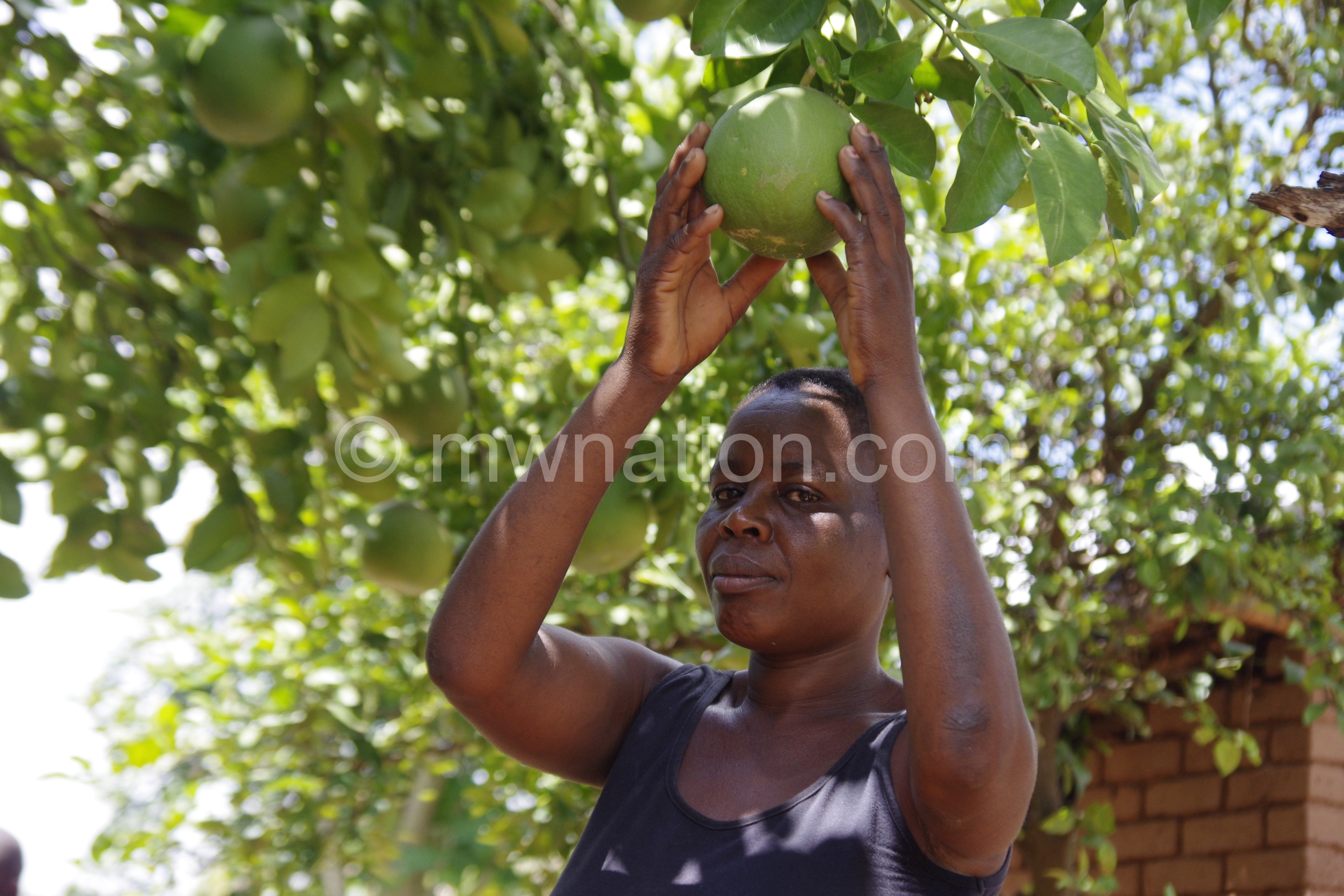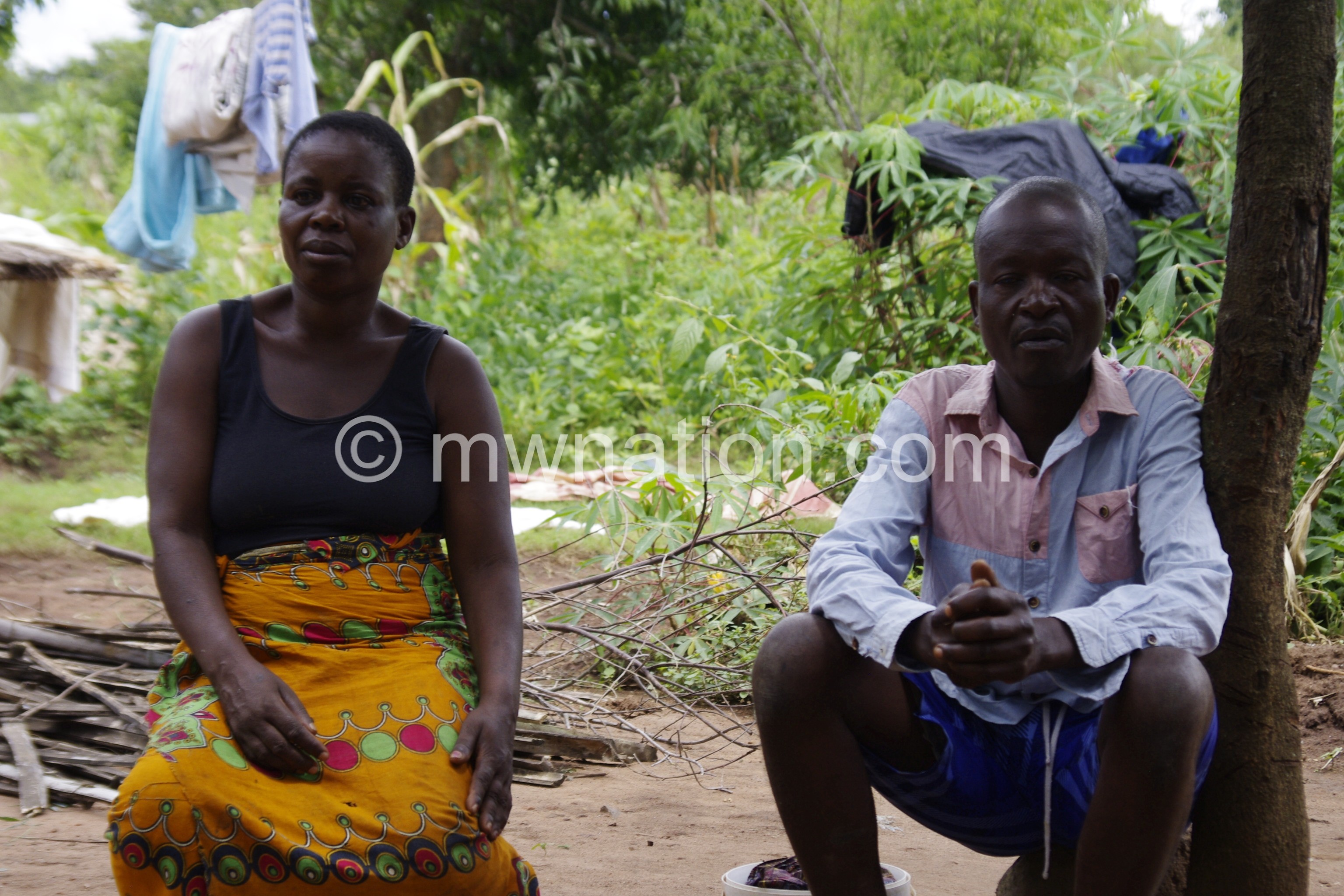Beating TB resistance 9 pills a day
Navenya’s fightback mirrors the hardships and hopes of Malawians with multi-drug resistant TB, our Features Editor JAMES CHAVULA writes.
In her homestead, Ethel Navenya paces towards a leafy tree sagging under the weight of bulging grapefruits. Grabbing one of the fleshy citrus fruits, she turns to her visitors sitting at a distance to avoid contracting a disease that has immobilised her for almost two years.

“They are not yet ready,” she says. “We will eat them in May or June because they are sweeter ripe.”
Her piercing tone exudes perceptible courage and triumph over adversity, a sense of defiance that tells onlookers: “I have overcome some worse hardships and I will soldier on.”
Confined to her home for the past 18 months, Navenya, 39, is not under house arrest. She has committed no crime against anyone, not even those who think they will be safer if she dies.
But if she is not told to come out of her grass-thatched hut, she will be bottled in, staring at a promising if not uncertain future, wondering why many people no longer visit her.

“I am a farmer, but I cannot tend to my crop fields. I once sold tomatoes and dry fish, but the business collapsed the day I knew why I couldn’t respond to early tuberculosis treatment. I am sick, but I don’t go to hospital. Instead, health workers bring me drugs now and again,” she says.
A Seventh Day Adventist faithful, the mother of one cannot go out to pray, cheer the sick, console the bereaved and attend weddings with the Women’s Guild she misses most.
“I used to be an active member of Dorica. Thank God, they haven’t forsaken me. They are among the few who usually come to pray for me.”
No death warrant
Navenya, from Mkaka Village in the outskirts of Thyolo Boma, is one of seven people in Thyolo who are enduring worsening hunger and poverty due to multi-drug resistant tuberculosis (MDR-TB).
The condition is highly infectious if not neutralised and health workers advise patients to stay put in their homes with little contact with the rest of the population.
However, the precautionary measure further fuels stigma and exclusion in a society where TB is widely perceived as a death warrant.
“When people knew that my TB is resistant to drugs, they thought I was dead. Many stopped coming to see me, fearing that I might infect them. But that’s not a big problem. My major worry is that I no longer do things that used to bring me and my family food, money and happiness,” she explains.
Her family, which used to produce surplus from maize and cassava fields surrounding her home, now relies on food rations donated by Development Aid from People to People (Dapp).
The relief items, which she receives every three months, includes 100 kilogrammes (kg) of maize, 20kg of nutritious porridge flour, four litres of cooking oil, 16 packets of soya pieces, two bottles of peanut butter and sibusiso supplements.
“Thanks to these Good Samaritans, I take three meals a day though I am too weak to tend to my farm. I take nine pills a day. When I take them on an empty stomach, I feel dizzy and frail,” she recounts.
In Thyolo, Dapp has established a community-based TB screening programme supported by 75 sputum collection centres, 750 trained volunteers and 24 community health workers in all 14 T/As.
Its project leader Frank Pachanya says: “Apart from conducting door-to-door visits that have drastically reduced the distance and barriers clients have to surmount to access testing, care and treatment, we also provide food to poor and vulnerable patients because they need adequate nutritious food for TB treatment to work as it should be.
“All MDR-TB patients get foodstuffs because they cannot produce their own or do business to generate income. The disease deepens hunger and poverty in their families.”
According to National TB Control Programme manager Dr James Mpunga, there are about 17 000 TB patients in the country and 6.7 percent of them are resistant to multiple drugs.
He endorses the feeding programmes are improving patients’ livelihoods, health and response to treatment.
“This is why the Ministry of Health runs a similar programme in which health facilities give TB patients food packages and reimburse their transport fares when they go for treatment,” he says.
Challenges persist
But lack of isolation wards in public hospitals has pushed patients to receive treatment and care in their homes where stigma and chances of infection are high.
Speaking on World TB Day two weeks ago, Minister of Health Atupele Muluzi stated that management of MDR-TB cases in communities is increasingly becoming a problem.
“I am aware that isolation services for these patients are inadequate and that treatment can take as long as two years, making it a challenge not just physically but also financially,” he said.
Government, bankrolled by World Bank, is establishing isolation wards for MDR-TB patients in nine hospitals, according to Muluzi.
“We will look to expand this to support the whole country over the coming years, focussing on the high risk areas,” he said.
The first nine district hospitals equipped with isolation wards exclude Thyolo where Navenya was diagnosed on October 1 2006.
They include Karonga, Rumphi, Mzimba, Kasungu, Lilongwe, Balaka, Blantyre and Nsanje, says Ministry of Health spokesperson Joshua Malango.
And the minister said something exciting for MDR-TB patients who find the present dosage too long a journey often paved with temptations them to let go.
“Government has procured newer medicine that will be taken for just nine months instead of two years, which has been a challenge,” he said.
According to Muluzi, hospitals will start prescribing the new medicine next month.
A dose of hope
The forthcoming dosage represents a drastic cut-back on what Navenya takes day after day.
She recalls: “When I got critically sick in 2015, I took TB drugs for six month without any success. Doctors at Thyolo District Hospital gave me injections for two months, but I didn’t get well.
“They prescribed another six-month dosage, but nothing changed. On October 1 2016, after some tests, they told me that my TB was not responding to ordinary treatment.”
Navenya instantly switched to the 24-months dose, starting with injections which run for eight months until May 2017 when she started swallowing the pills.
“I’m getting better and there is no doubt I will be OK when I take the last pill in October,” she says, brimming with optimism.
She looks three years back, saying she was a frail frame.
“I lost lots of weight. I was sweating endlessly at night. I coughed hard. My feet pained like I was standing on burning charcoals and I didn’t have any appetite for food. But all that is gone. I cannot wait to finish the dosage,” she says.
According to Mpunga, the country registers 50 new cases of MDR-TB every year and 70 percent of them are successfully treated.
“This outcome is quite encouraging considering that the success of some countries in our region, Sadc [Southern Africa Development Community], were as low as 50 – 25 percent last year,” he says.
With her dosage almost complete, Navenya hopes to be among the healed are growing every day.
No hard feelings
She has regained her body weight, rising from 42kg to 54 since last September, she says.
In fact, Steven Masaula says her wife of 15 years looks healthy and unrecognisable to those who saw her a year before.
“Some people tell me to leave her, saying she will kill me. But I am here to love and care. I promised to be with her for better or for worse. We encourage each other and remind each other to take our drugs as prescribed. I also do piecework to generate income. She has improved greatly and this keeps us hoping for the better,” he narrates.
Navenya smiles wryly, feeling loved, certainly.
Gazing at the abundance of globular fruits dangling in the tree in her backyard, her eyes glowed.
Once trolled as a dead person walking, she has a word for doubters: “I do not have hard feelings against anyone. When the fruits are ripe, I will share some with my neighbours and keep some because my family and I need them for our wellbeing.” n





